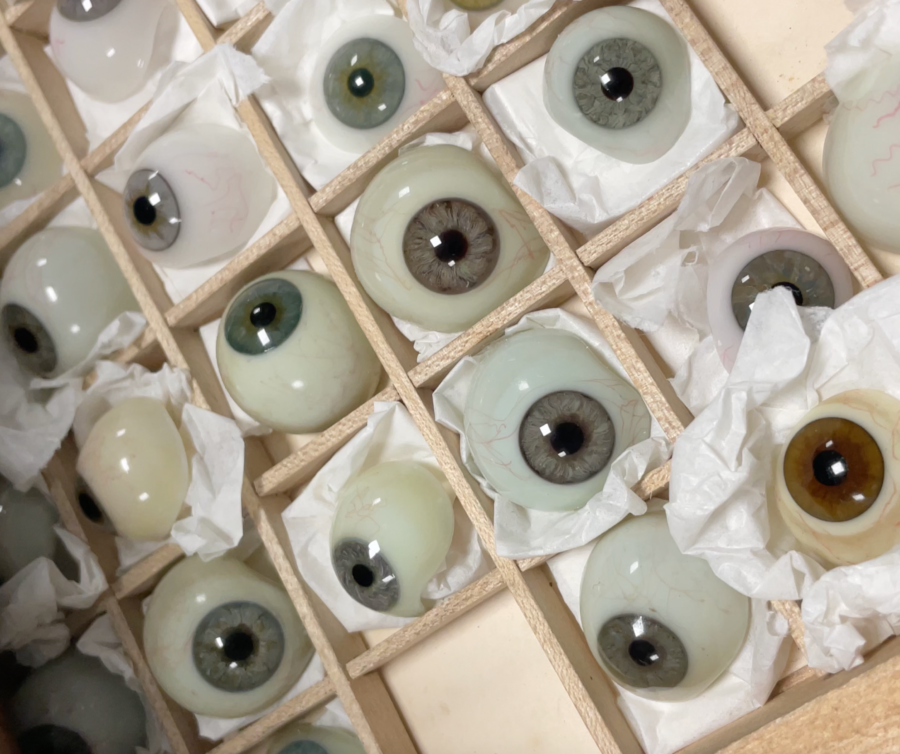This half term, Thackray will be hosting an exciting event, all about our eyes! Ahead of this, we spoke to Optometrist Stephen Clark to learn more about modern eye care and some interesting facts from the past!

We started by asking him about the role of an optometrist. ‘An optometrist is a person who can look into your eyes and check for any need for glasses. They normally work in an opticians on the high street but some work in hospitals too…Optometrists mostly do sight tests for people coming into an opticians so they know what strength glasses the person might need, but can also sort out eye-related problems like sore, gritty or red eyes.’
Speaking more about how we treat eyes today, he said ‘Many things that optometrists identify are treatable nowadays. If you need glasses, that’s easy to sort out, but some people need to be seen by an eye doctor who can sometimes offer eye operations. People who need an eye doctor’s help are usually older than most of us. For example cataracts are where the natural lens inside the eye becomes cloudy stopping the person from being able to see well. There is an operation to remove this lens and replace it with a clear plastic lens. This only takes around 15 mins and is the most common operation the NHS do.’
Like any form of healthcare, there are some do’s and don’ts! ‘Smoking is bad for the eyes and eating green leafy vegetables is great for eye health. People who smoke are 4 times more likely to lose their central vision when they are older (over 70), we call this Age Related Macular Degeneration. Ultraviolet (UV) light can cause damage to the eyes as well so wearing sunglasses or a hat with a brim at the front on sunny days is a good idea.’

He recognises that optometry has changed a lot over the years. ‘The key differences between care 70 years ago and now is lasers. Lasers are very strong lights that can remove tissue or burn if aimed inside the eyes. Eyes are perfect for letting light through so eye doctors can aim a special laser inside someone’s eyes without any cutting and treat all sorts of diseases nowadays. If someone needs an operation like a cataract removed we do this and send them home the same day now, but 40 years ago people were in hospital for a week with eye patches on the whole time.’

Not for the squeamish, he told us some facts about eye cares gruesome past. ‘The ancient Egyptians used to remove cataracts by poking the eye with a stick dislodging the cloudy lens into the back of the eye. It was only for high ranking people like Pharaohs and wasn’t very successful. If the person couldn’t see afterwards they used to chop the person’s hand off…not much chance to get good at it!’ – I guess practice doesn’t always make perfect!
When asked about eyecare myths, Stephen set out to dispel some and we learnt that the old tale of eating carrots to see in the dark isn’t completely unfounded! ‘“Wearing glasses makes your eyes worse” – not true. What does happen is short sighted people, (whose eyes have grown a little too big), grow bigger over time even if they don’t wear glasses. It’s also normal for people over 50 to struggle to read books without glasses as their natural lens becomes less flexible over time. This is not made worse by wearing glasses but does naturally get more noticeable over time. “Carrots make you see in the dark” – carrots have lots of vitamin A in them which is needed by the retina inside the eye to see. If someone is Vit A deficient, eating carrots will help them see in the dark! However almost no one in the UK is deficient in Vit A so it won’t normally have this effect here.’
